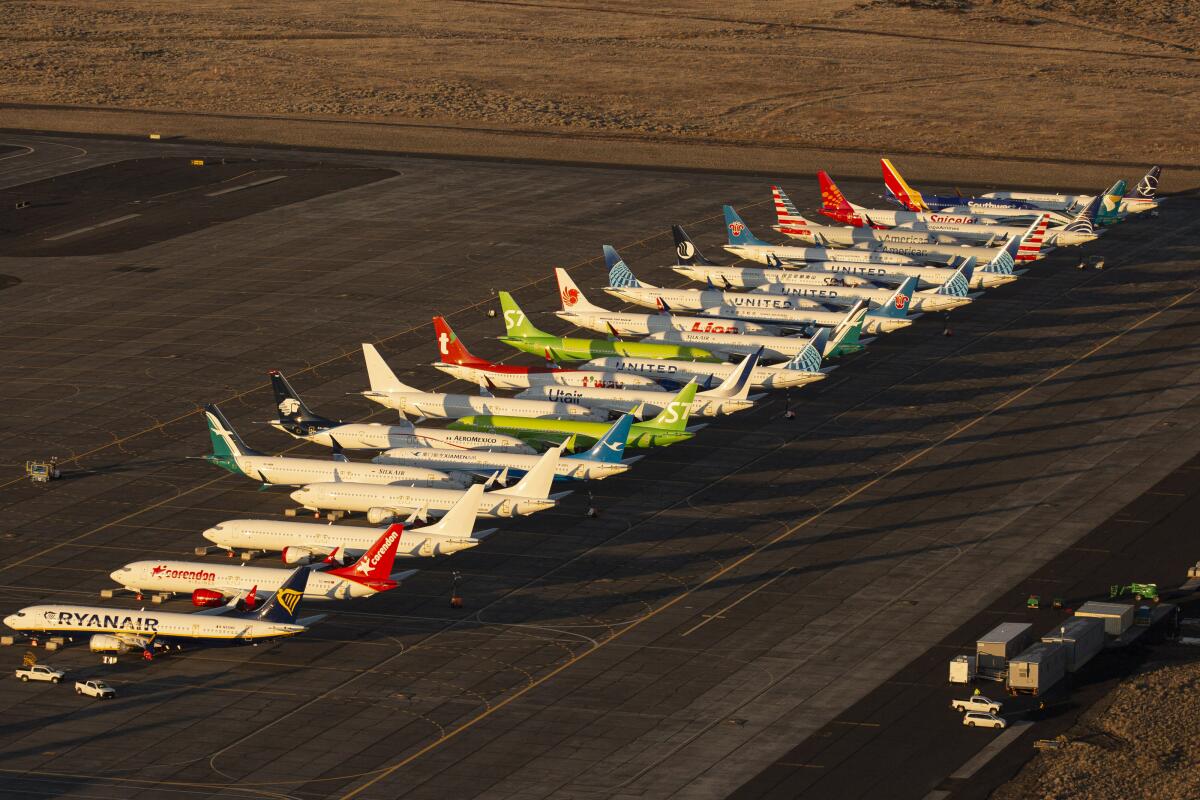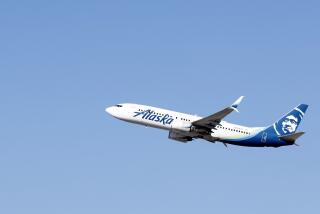Boeing recommends 737 Max pilots get simulator training — a reversal

- Share via
Boeing Co. is recommending that airlines put pilots through simulator training before they fly the 737 Max, a stunning reversal that is intended to reassure the flying public of the grounded jetliner’s safety after two deadly crashes.
The planemaker has notified the Federal Aviation Administration of the shift in its views, and the U.S. regulator will make a final decision. Boeing is looking at modifying simulators of an older 737 model, given the shortage of equipment designed specifically for the Max, said a person familiar with the matter who asked not to be named because the discussions were still private.
Boeing is abandoning its earlier stance that pilots of the earlier 737 version would only need computer-based instruction to fly the Max — a key selling point because it would enable airlines to avoid taking pilots out of the field for pricey simulator sessions. Although adding the new requirement isn’t expected to affect the timing of the Max’s recertification by global regulators, the person said, the move could create new delays as airlines scramble to train pilots.
“Safety is Boeing’s top priority,” Greg Smith, Boeing’s interim chief executive, said in a statement. “Public, customer and stakeholder confidence in the 737 Max is critically important to us, and with that focus Boeing has decided to recommend Max simulator training combined with computer-based training for all pilots prior to returning the Max safely to service.”
The final determination on pilot preparation will be made by the FAA and its regulatory counterparts around the world. The agency confirmed Boeing’s recommendations for flight crew simulator training in an emailed statement.
“The FAA is following a thorough process, not a set timeline, to ensure that any design modifications to the 737 Max are integrated with appropriate training and procedures,” it said in the statement.
Boeing shares climbed 1.1% on Tuesday.
The Chicago aerospace giant decided to recommend simulator training after inviting airline pilots to test redesigned Max flight-control software in early December. Although all of the aviators were able to safely resolve issues in those sessions, some failed to follow the company’s checklists, said a person briefed on the matter.
Pilot training remains a major issue as Boeing works through the final milestones with regulators toward recertifying the 737 Max for flight. Requiring simulator sessions creates new logistical headaches for airlines that could lengthen the time between when the grounding is lifted and when the plane is worked back into airline schedules.
Southwest Airlines Co., the largest 737 Max customer, said in a statement before Boeing’s announcement that it was confident that computer-based training would have been sufficient to supplement its existing training program.
“That being said, we stand ready to comply with the FAA’s final recommendation and have teams within Southwest that are considering training models for both simulator or computer-based training programs,” the carrier said. “Since our plans are in the early stages as we await further guidance, we don’t have any time or cost estimates to offer.”
Boeing’s decision on simulator training was reported earlier by the New York Times.
The training recommendation by Boeing reverses an FAA advisory group’s tentative proposal in April and suggests that there is growing momentum for at least some simulator-based training before thousands of pilots around the world can resume flying the Max. The plane has been grounded worldwide since March.
The Flight Standardization Board report from April was opened for public comment, but it was never finalized as Boeing made extensive changes to the flight control system’s architecture over the following months.
The board is awaiting input from a group of international pilots known as the Joint Operations Evaluation Board, which will conduct “rigorous validation testing that will help the FAA and other international regulators evaluate proposed flight training and emergency procedures,” the FAA said in a statement.
More to Read
Inside the business of entertainment
The Wide Shot brings you news, analysis and insights on everything from streaming wars to production — and what it all means for the future.
You may occasionally receive promotional content from the Los Angeles Times.










